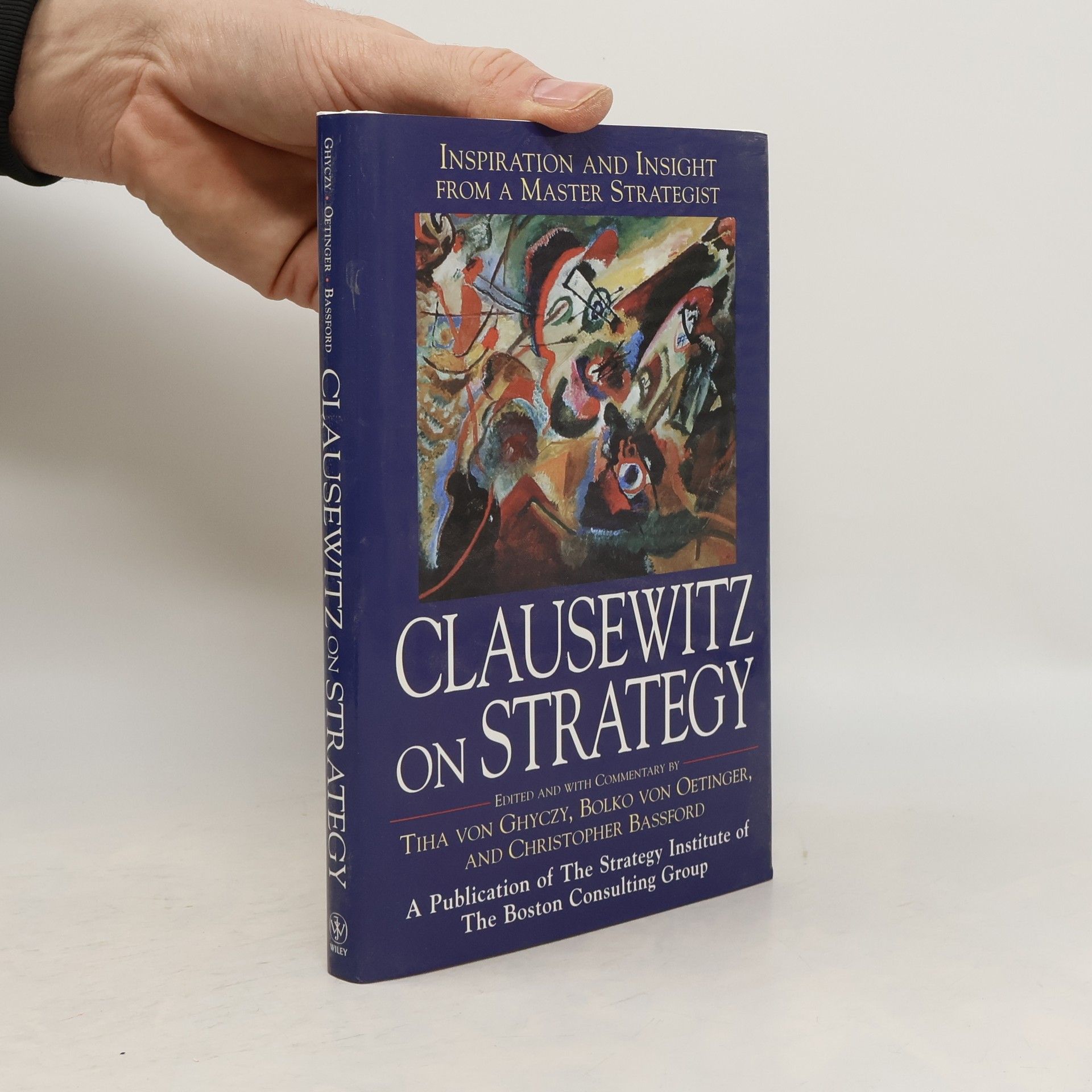Napoleon's 1796 Italian Campaign
- 352 pages
- 13 hours of reading
First translation into English of Clausewitz's most important campaign history, which offers key insights into his theoretical classic On War.
Carl von Clausewitz was a Prussian soldier, military historian, and theorist whose seminal work fundamentally shaped the understanding of warfare. His writings delve into the nature of conflict, emphasizing its intrinsic connection to political objectives and its inherent unpredictability. Clausewitz meticulously analyzed the interplay between military strategy and political aims, establishing foundational concepts that remain influential. His profound insights continue to inform strategic thinking and the study of armed conflict.







First translation into English of Clausewitz's most important campaign history, which offers key insights into his theoretical classic On War.
The book reveals a previously suppressed commentary by Carl von Clausewitz, a prominent military theorist, on the Battle of Waterloo. Historian Peter Hofschröer presents this fresh perspective, challenging the notion that all insights on the battle have already been uncovered. Through Clausewitz's analysis, readers gain a deeper understanding of the strategic complexities and implications of this pivotal historical event.
A sharply-observed study of one of the major turning points in history. A superb first-hand account from an officer on the Russian Imperial Staff. Includes a detailed examination of the Battle of Borodino.
Think about strategy and sharpen judgment in an unpredictable environment Carl von Clausewitz is widely acknowledged as one of the most important of the major strategic theorists; he's been read by Eisenhower, Kissinger, Patton, Chairman Mao, and numerous other leaders.
"War is not merely a political act, but also a real political instrument, a continuation of political commerce, a carrying out of the same by other means." -Carl von Clausewitz, On War, 1832 On War is Carl von Clausewitz' masterpiece on war and military strategy, which was written between 1816 and 1830 and was published posthumously by his wife Marie von Clausewitz (née von Brühl) in 1832. Three main concepts of war stand out: war should be seen as an instrument of politics; the military objectives in war that support one's political objectives fall into two types: "war to achieve limited aims" and war to "disarm" the enemy; and the course of war will tend to favor the party with the stronger emotional and political motivations, but especially the defender. This edition is the classical translation of On War (1873) by Col. J.J. Graham, with an introduction and notes by Colonel F.N. Maude, published in three volumes. A must-read for military historians and theorists, policy makers, and anyone interested in understanding the philosophy and concepts of war.
Covers the period of Napoleon's invasion of Egypt and focuses on the Second Coalition's campaign in Italy and their victories under Suvorov's dynamic leadership that carried the tide of battle up against the French frontier. This first English translation of volume 5 of Clausewitz's collected works conveys the character of Clausewitz's writing in all its registers.
Carl von Clausewitz - Lebensbild eines patriotischen Militärs und fortschrittlichen Militärtheoretikers
L'offensiva è l'elemento fondamentale della guerra. Lo dimostra in queste pagine un grandissimo teorico dell'arte militare, forse il più grande di tutti, Carl von Clausewitz. Questa antologia di brani tratti dal suo celeberrimo trattato "Della guerra", curata da uno dei massimi studiosi di storia militare, Gastone Breccia, è dedicata principalmente alle strategie offensive, sui campi di battaglìa e nella vita. Perché tutti noi siamo come piccoli Stati, determinati a raggiungere i nostri obiettivi anche a costo di metterci in contrasto con altri individui. E spesso ci troviamo costretti a "muovere guerra": è indispensabile tenere presenti allora le regole fondamentali che rispecchiano la natura stessa dei conflitti. Qui si rivelano tutta la genialità e l'attualità del grande teorico prussiano di inizio Ottocento. Nessuno ha saputo analizzare l'essenza e i caratteri della guerra con tale profondità, ed è per questo che leggere il suo testo, dopo duecento anni e in un mondo socialmente, politicamente e tecnologicamente così diverso, è di estremo interesse non solo per gli specialisti ma per chiunque si trovi a misurarsi con una situazione conflittuale. Il che, prima a poi, capita davvero a tutti.
Ein völlig neuer Blick auf den verkannten Klassiker Carl von Clausewitz (1780-1831) gilt als einer der bedeutendsten strategischen Denker. Heute ist der preußische Visionär so aktuell wie nie zuvor: Die Parallelen zwischen der fundamentalen Umbruchsituation seiner Zeit und den rasanten Umwälzungen des 20. und 21. Jahrhunderts sind unübersehbar. Clausewitz entwickelt keine Lehre mit festen Regeln, sondern bietet kluge Wege des Denkens an, wie man sich in Zeiten der Unsicherheit strategischen Entscheidungen nähert. Führende Analytiker des Bostoner Strategieinstituts haben für diesen Band zentrale und prägnante Texte von Clausewitz selbst zusammengestellt und liefern eine zeitgemäße Interpretation für das heutige Management. Ein »herausragendes Buch.« Dagmar Deckstein, Süddeutsche Zeitung